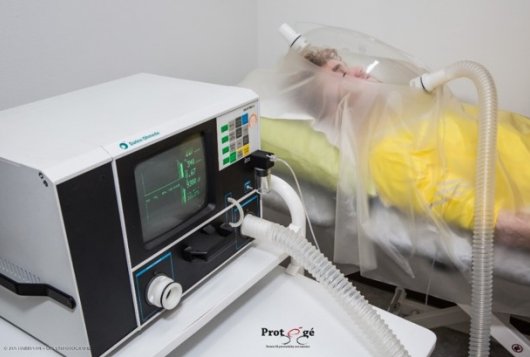
Course
Energy Metabolism and Body Composition in nutrition and health research
a brief, intensive online course at an advanced level, which provides the participants with up-to-date information about state-of the art methodology and current issues in energy metabolism and body composition research. Due to the online nature of the course, techniques cannot be practised during the course, but there will be ample opportunity to discuss practical issues with the course leaders.
Background
Changes in energy balance result in weight gain or loss and changes in body composition. Disturbances in energy metabolism like mitochondrial dysfunction and metabolic inflexibility are linked to metabolic health and chronic diseases. Both diet and physical activity, but also ageing and chronic diseases like cancer, can affect energy metabolism, energy balance and body composition.
This course will give an overview of state-of-the-art methods to measure body composition and energy metabolism and its application, and will touch upon some major (patho)physiological aspects of energy metabolism and health.
Target group
The course is aimed towards research professionals who are at the start of their career in nutritional or health sciences, or other scientists who want to become familiar with the field of energy metabolism and body composition in nutrition and health research. Participants should have a background in biology, medicine, food/nutritional science, or other life sciences and should have basic knowledge of human biology, physiology and nutrition.
Course aim
Approach: a brief, intensive online course at an advanced level, which provides the participants with up-to-date information about state-of the art methodology and current issues in energy metabolism and body composition research. Due to the online nature of the course, techniques cannot be practised during the course, but there will be ample opportunity to discuss practical issues with the course leaders.
After this course the participant;
- knows the principles of common state-of-the-art methods to measure body composition and energy metabolism in humans,
- knows how and why to choose an appropriate method when studying energy metabolism or body composition,
- is familiar with some major physiological aspects of energy metabolism, body composition and health, and the (patho)physiologic changes that occur during ageing and disease
Course design
The course consists of 5 half-day course sessions, which contain a series of key-lectures, discussions, and group exercises. Course sessions will be interactive and given by experts form inside and outside Wageningen University. Some preparation for the sessions is required, e.g. reading papers, watching clips.
In addition there is the opportunity to present your own (future) work in the area of body composition and energy metabolism in the presence of experts (‘Master class’).
Masterclass: If you want to present your work during the course, please send a short abstract to marco.mensink@wur.nl
Programme topics
Amongst others the following topics will be covered:
- Basic principles of body composition (compartment models) and energy metabolism (e.g MET, PAL, RMR/DIT/TEE)
- Methods to assess energy expenditure, e.g. DLW, accelerometery and indirect calorimetry
- Methods to assess body composition, e.g. deuterium/D3-creatin dilution, BIA, DEXA, and imaging techniques (CT/MRI/MRS/ultrasounds)
- Approaches to asses mitochondrial functioning (NIRS, respirometry, 31P-MRS)
- Energy balance and physical activity
- Energy metabolism, metabolic flexibility, mitochondrial function in health and disease
Organisation
Course coordinators
- Dr Marco Mensink, Division of Human Nutrition and Health, Wageningen University & Research
- Dr Arie Nieuwenhuizen, Human and Animal Physiology, Wageningen University & Research
- Dr Renate Winkels, Division of Human Nutrition and Health, Wageningen University & Research
Keynote speakers
- Prof Massimo Mischi, Biomedical Diagnostics (BM/d) research Laboratory, Signal Processing Systems group, Eindhoven University of Technology, NL
- Prof Tom Preston, Professor of Stable Isotope Biochemistry, Scottish Universities Environmental Research Centre, University of Glasgow, UK
- Dr Guy Plasqui, associate professor Human Energy metabolism, Department of Nutrition and Movement Sciences, Faculty of Health, Medicine and Life Sciences, Maastricht University, NL
- Dr Vera Schrauwen, Associate Professor Metabolic Imaging, Department of Imaging / Nutrition and Movement Sciences, Faculty of Health, Medicine and Life Sciences. Maastricht University, NL
Other faculty
- Dr Sander Grefte, Human and Animal Physiology, Wageningen University & Research
Date & duration
The course will be held online. The 3h course lectures will run in the afternoon of 5 Tuesdays (from 12-01 until 09-02);
- Tuesday 12-01 from 14.00-17.00
- Tuesday 19-01 from 14.00-17.00
- Tuesday 26-01 from 14.00-17.00
- Tuesday 02-02 from 14.00-17.00
- Tuesday 09-02 from 14.00-17.00
Study load
The study load of this course is 0.7.0 ECTS credits for participation in all 5 sessions.
Prior to the start we ask each participant to fill out an online questionaire with background information, expectations and preferred learning outcomes.
Language
The course language will be English.
Contact information
Information concerning the course contents can be obtained from Dr Marco Mensink, e-mail marco.mensink@wur.nl
For organisational matters please contact:
Mrs. Cornelia van Bree-Evers
Email:cornelia.vanbree-evers@wur.nl
Location
The course is offered online. Details how to attend the online sessions, will be send shortly after registration.
Registration & course fee
Registration for this course is closed.
Course fee includes online course materials. The course fee depends on the participant's affiliation:
| PhD candidates affiliated with VLAG, PE&RC, EPS, WIAS, WASS, SENSE/WIMEK | € 100 |
| other PhD candidates / postdoc affiliated with VLAG | € 225 |
| University Staff / Non-Profit organisations | € 300 |
| Industry / For-Profit | € 450 |
Cancellations policy
- No charge until 21 December 2020
- 25% of the course fee paid or due till 5 January 2021
- No refund after 5 January 2021
Substitutions for participants may be made at any time until the start of the course.